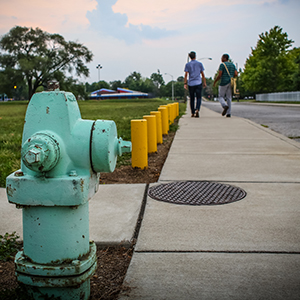 Report identifies key factors for improving public safety including job opportunities, educational attainment, data driven community-wide strategies
Report identifies key factors for improving public safety including job opportunities, educational attainment, data driven community-wide strategies
INDIANAPOLIS, IN (June 30, 2015) – The lack of a high school diploma, insufficient job opportunities and a need for data-driven public safety strategies are threats to public safety in Indianapolis according to The Importance of Community, a report released today by The Indianapolis Foundation.
An affiliate of Central Indiana Community Foundation, The Indianapolis Foundation was selected by the City-County Council of Marion County and Indianapolis in 2013 to administer the $2 million annual Marion City-County Community Crime Prevention Grant Program. The Importance of Community was created to help the grant program better serve the City of Indianapolis and its residents by identifying key causes and potential solutions for improving public safety in Indianapolis. The report also contains an outcome summary for the Community Crime Prevention Grant Program from 2013-2014.
Key research findings include:
- The majority of inmates in the U.S. lack a high school diploma.
- Communities and jobs matter: strong communities, with strong family structures, that are connected to workforce opportunities experience less crime, particularly less violent crime.
- The majority of violent crime is committed by a small network of residents with prior criminal offenses and associated with other residents with criminal histories.
- The vast majority of previously incarcerated residents will likely be re-arrested and return to prison, resulting in huge demands on public resources, our local public safety and criminal justice systems.
- Collective action, supported by data driven strategies, has proven to be most effective in addressing critical community challenges, especially when seeking to reduce violent crime.
Key 2013-2014 program outcomes include:
- 2013-2014 Community Crime Prevention Grant program provided $910,000 to adult serving organizations serving a reported 3,482 adult Indianapolis residents.
- Forty percent of the county’s crime during 2013-2014 was committed in five of the county’s 38 zip codes (46201, 46205, 46208, 46218, and 46222).
- Fewer than 7 percent of the 3,482 adults served reported by 21 program grantees did not have a prior criminal conviction.
- Out of the more than 3,300 adult residents with employment status reported by program grantees, only 15 percent were reported as being employed at the time of the grant reporting. More than half of the residents with a reported employment status (1,700) received some sort of employment assistance. Less than 10 percent of those residents were employed for more than 180 days.
- From 2013-2014, the Community Crime Prevention Grant Program provided $890,000 to youth serving organizations, serving a total of 7,062 Indianapolis youth between the ages of 12 and 22.
- Over 34% (2,350) of all youth served were identified as residents of Indianapolis Metropolitan Police Department’s five Marion County high crime zip codes; more than 12% (839) of youth served reported residing in the 46218 area code alone.
- Of the total 7,062 youth served, only 1,382 (20%) youth were identified as having an employment status. There were a total of 162, or approximately 12% of youth with a reported employment status, working at the time the final grant reports were due for the Community Crime Prevention Grant. What is more telling is that only 2% of total youth served were reported as working during the 2013 CCPG.
“The Indianapolis Foundation has helped donors make transformative grants based upon research, community knowledge and a commitment to supporting effective not-for-profits since 1916,” said Brian Payne, President and CEO, Indianapolis Foundation and CICF. “We are proud of our work supporting the City of Indianapolis and our community’s residents to improve public safety and will use the data collected in this report to better inform our efforts administering the Community Crime Prevention Grant Program.”
CICF donors have also contributed an additional $287,500 toward public safety-focused programs and not-for-profits, Payne said. CICF created a privately-funded College Readiness and Success Initiative in 2008 emphasizing a post-secondary degree attainment, and is also incorporating a greater focus on high school diploma attainment as a result of the report’s findings.
“On behalf of the Department of Public Safety and all of those who strive to make Indianapolis safer, I am grateful that The Indianapolis Foundation and CICF have created and released this comprehensive crime prevention report, one of the most thorough reviews that has been completed,” said Troy Riggs, Director of Public Safety, City of Indianapolis. “This report clearly demonstrates CICF’s commitment to being both a good steward of public resources and a critical community partner for improving the quality of life of Indianapolis residents.”
Riggs noted that, as recommended in the report, “Our greatest opportunity to achieve lower, sustainable crime rates is to use data to inform our strategies, work collaboratively as a community, and vigorously address quality of life issues that are root causes of crime.” According to Riggs, as of June 22, 2015, homicides in Indianapolis had decreased by 40 percent in the past six months, and that shootings had also declined in 2013 and 2014.
A complete copy of the report can be seen here.
ABOUT THE COMMUNITY CRIME PREVENTION GRANT PROGRAM:
In August 2006, the Community Crime Prevention Task Force was convened to study the root causes of crime in the community, determine the types of programs most likely to prevent crime or effectively intervene in the lives of those at risk of criminal behavior, and make recommendations about how the community could prevent crime in the future. The task force examined the underlying problems that led to a surge in violent crime in Indianapolis and in 2007 recommended actions to stem the violence and to prevent crime before it occurs.
In July 2007, the City-County Council passed Proposal No. 264 to increase the County Option Income Tax (COIT) and establish the Community Crime Prevention Grant Program to provide funding for crime prevention initiatives recommended by the Task Force its January 2007 final report. In June 2012, the Community Crime Prevention Grant Program awarded over $1.8M to 18 organizations that specifically provided support to youth programs and to programs that helped previously incarcerated individuals back in to jobs and back in to the community.
At the request of the City-County Council, in April 2013, The Indianapolis Foundation, a Central Indiana Community Foundation (CICF) affiliate, entered into a contract with the City of Indianapolis to manage the $2 million Community Crime Prevention Grant Program.
Since being named the administrator of the Community Crime Prevention Grant Program in April 2013, The Indianapolis Foundation has worked to create a process that is transparent and holistic in its approach of administering public resources to achieve the greatest public impact. This work included a “listening tour” with many of the city’s criminal justice system leaders and non-profit organizations that provide related and/or associated crime prevention services. The Foundation will continue to solicit input from community leaders and residents to help develop strategies that address both the symptoms and root causes of crime in Indianapolis and Marion County.
For additional information, Community Crime Prevention Grant organizations can visit here or contact Alicia Collins at aliciac@cicf.org or 317.634.2423.
ABOUT THE Indianapolis Foundation:
Established in 1916, The Indianapolis Foundation was one of the first community trusts in America. The Foundation is a public charity and an affiliate of Central Indiana Community Foundation (CICF), a collaborative effort between the community foundations serving Marion and Hamilton Counties. As Indiana’s oldest and largest community foundation, The Indianapolis Foundation was created to ensure that the quality of life in Marion County continuously improves; to help where the needs are greatest and the benefits to the community are most extensive; and to provide donors a vehicle for using their gifts in the best possible way now, and in the future as conditions in the community change.
It awards approximately $7 million annually to support current and future community needs, and is governed by a board of six publicly-appointed trustees (Two are appointed by the Mayor of Indianapolis; two by the Marion County Circuit Court Judge; and two by the United States District Court presiding over Indianapolis).
ABOUT Central Indiana Community Foundation:
Central Indiana Community Foundation (CICF) is a $720 million public charitable foundation transforming the lives of central Indiana residents in three ways: consulting donors, family foundations and their professional advisors on charitable giving; awarding grants to effective not-for-profit organizations; and providing leadership to seize opportunities and address community needs. CICF was established in 1997 as a partnership between The Indianapolis Foundation, serving Marion County since 1916, and Legacy Fund, serving Hamilton County since 1991. For more information about CICF, visit cicf.org, or contact Tamara Winfrey-Harris at tamarawh@cicf.org.






Leave A Comment